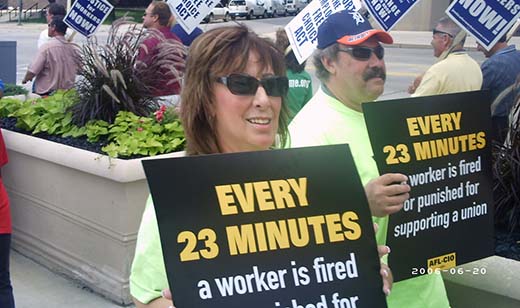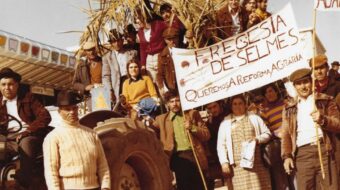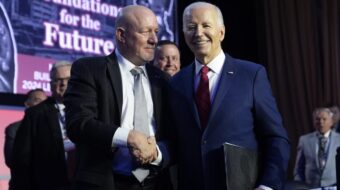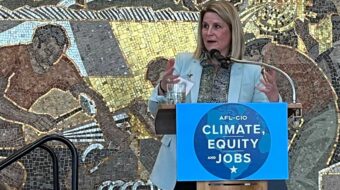
WASHINGTON – Unions, led by the Teamsters, the Laborers, the United Food and Commercial Workers, and the AFL-CIO, strongly backed the National Labor Relations Board’s recent proposal to change union recognition election procedures.
In their comments to the board before the Aug. 22 deadline, the unions said the changes would improve the fairness of the elections process and remove some of the delays businesses now use to frustrate workers’ rights and union organizing drives.
Meanwhile, business, led by the Chamber of Commerce, the Society for Human Resource Management, and the National Retail Federation, organized mass letter-writing campaigns; each drafted identical language for letters opposing the changes.
As a result, the agency set another deadline, of Sept. 6, for replies to the prior comments – and it had to field almost 23,000 comments overall, not counting the 21,000 workers’ statements the AFL-CIO said it included in its formal comment.
The NLRB wants to give its regional directors discretion to deny review of post-election rulings. It also would postpone deciding election challenges until after the vote if the challenges involve less than a fifth of the workforce. And it would set deadlines for employers to meet to file objections, while removing some of the chances they now have to delay elections beforehand. More communications would be electronic, as well.
Among other things, the changes would take the uncertainty of scheduling a date for a representation election.
The net effect, the NLRB says, would make election campaigns more predictable and fair to both sides. Firms routinely use the delays now in the recognition election process to fire, harass, and intimidate workers, as well as for labor law-breaking. So-called “union avoidance” consultants and law firms often coach and run anti-union drives.
“The proposed rule provides a path to help ensure that workers who want to vote to have a union have a fair choice. The rule, which experts agree is a modest step to remove roadblocks and reduce costly litigation, has fallen under a torrent of politically motivated attacks. In stark contrast, the voices of working people nationwide expressed through the comments demonstrate the critical need for fairness and balance in labor laws,” the AFL-CIO said.
Teamsters President James Hoffa said the NLRB’s proposals would not only help workers but – counter to the screams of the Right – preserve the secret ballot in union recognition elections. He noted the Teamsters participate in more recognition elections, year in and year out, than any other union.
“In many cases, workers overwhelmingly want to join a union,” his formal letter said. “But employers are skilled at taking advantage of antiquated rules and preventing workers from benefiting from a collective bargaining agreement. They are able to waste the government’s resources with frivolous appeals.
“Our affiliates’ experience with the current election procedures is they are unfair, confusing, outdated, and susceptible to abuse by unscrupulous employers seeking to prevent their workers from exercising their right to organize by obstructing and delaying the process,” Hoffa wrote. “The proposed changes will streamline the election process, reduce uncertainty, promote fairness,” and “strengthen the secret ballot process.”
Laborers President Terry O’Sullivan said much the same thing when he commented on the NLRB’s proposals before hearings began earlier this year.
“These modest changes will help level the playing field for working men and women. The common-sense reforms NLRB proposed will begin to bring union elections into the 21st century and are a step toward reducing the possibility of unscrupulous employers interfering with the right of workers to make an informed decision on whether to unionize,” he said.
“When workers choose to vote to form a union on the job, the vote shouldn’t be plagued by delays, bureaucracy or obstacles,” UFCW said. “Working people are already struggling. And, they’re waiting and wondering when the economy will recover to a point that there’ll be enough stable, middle class jobs in their communities. They shouldn’t have to struggle to get a union voice on the job. They shouldn’t have to wait and wonder when they’ll get justice on the job.”
Rep. Earl Blumenauer, D-Ore., sent a three-paragraph letter supporting the NLRB’s changes. “Votes for unionization are often bogged down by litigation, manipulation and delays,” he said. He too praised “common sense rules” that let workers and firms “avoid uncertain timelines and costs.”
A commenter whom the AFL-CIO cited in its statement, identified only as “Philip from Colorado,” wrote to the NLRB: “I fully support and applaud your actions in cleaning up the rights of American workers to collectively bargain for compensatory pay and benefits. Corporations consciously ignore the very foundation of their success, which is the workers. I only wish that laws could be in place to protect every worker – whether they are union, or not.”
Photo: Creative Commons 2.0

MOST POPULAR TODAY

After months of denial, U.S. admits to running Ukraine biolabs

Ohio: Franklin County treasurer attends Netanyahu meeting, steps up Israel Bond purchases

‘Warning! This product supports genocide’: Michigan group aims to educate consumers


“Trail of Tears Walk” commemorates Native Americans’ forced removal






Comments